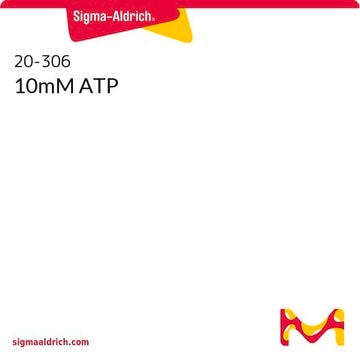FLAAB
Adenosine 5′-triphosphate (ATP) assay mix dilution buffer
lyophilized powder
Sinónimos:
ATP Assay Dilution Buffer, Assay Mix Buffer, Assay Mix for ATP
Iniciar sesiónpara Ver la Fijación de precios por contrato y de la organización
About This Item
UNSPSC Code:
12352202
eCl@ss:
32160414
NACRES:
NA.84
Productos recomendados
Categorías relacionadas
General description
Adenosine 5′-triphosphate (ATP) assay mix dilution buffer is a component of the ATP bioluminescent assay kit that may be employed for the quantitative bioluminescent determination of ATP in experimental samples.
Application
Adenosine 5′-triphosphate (ATP) assay mix dilution buffer has been used to determine the level of adenosine kinase activity in isolated sections of mouse hippocampi. It has also been used to measure the ATP content in oocytes and harderian gland(HG) tissue homogenates.
Components
Adenosine 5′-triphosphate (ATP) assay mix dilution buffer contains MgSO4, dithiothreitol (DTT), ethylene diamine tetraacetic acid (EDTA, bovine serum albumin (BSA), and tricine buffer salts.
Reconstitution
Reconstitute with 50 mL of sterile water.
signalword
Danger
hcodes
Hazard Classifications
Eye Dam. 1
Storage Class
11 - Combustible Solids
wgk_germany
WGK 3
flash_point_f
Not applicable
flash_point_c
Not applicable
ppe
Eyeshields, Gloves, type N95 (US)
Certificados de análisis (COA)
Busque Certificados de análisis (COA) introduciendo el número de lote del producto. Los números de lote se encuentran en la etiqueta del producto después de las palabras «Lot» o «Batch»
¿Ya tiene este producto?
Encuentre la documentación para los productos que ha comprado recientemente en la Biblioteca de documentos.
Los clientes también vieron
Peter Stief et al.
BMC microbiology, 14, 35-35 (2014-02-13)
A wealth of microbial eukaryotes is adapted to life in oxygen-deficient marine environments. Evidence is accumulating that some of these eukaryotes survive anoxia by employing dissimilatory nitrate reduction, a strategy that otherwise is widespread in prokaryotes. Here, we report on
Nicolette Gouder et al.
The Journal of neuroscience : the official journal of the Society for Neuroscience, 24(3), 692-701 (2004-01-23)
Endogenous adenosine in the brain is thought to prevent the development and spread of seizures via a tonic anticonvulsant effect. Brain levels of adenosine are primarily regulated by the activity of adenosine kinase. To establish a link between adenosine kinase
Andrea Boyd-Tressler et al.
The Journal of biological chemistry, 289(39), 27246-27263 (2014-08-13)
Anti-tumor immune responses have been linked to the regulated release of ATP from apoptotic cancer cells to engage P2 purinergic receptor signaling cascades in nearby leukocytes. We used the Jurkat T cell acute lymphocytic leukemia model to characterize the role
Hana M Russo et al.
Journal of immunology (Baltimore, Md. : 1950), 197(4), 1353-1367 (2016-07-08)
Canonical inflammasome activation induces a caspase-1/gasdermin D (Gsdmd)-dependent lytic cell death called pyroptosis that promotes antimicrobial host defense but may contribute to sepsis. The nature of the caspase-1-dependent change in plasma membrane (PM) permeability during pyroptotic progression remains incompletely defined.
Nobuhiro Moro et al.
Experimental and therapeutic medicine, 21(6), 575-575 (2021-04-15)
The aim of the current study was to determine effects of mild traumatic brain injury (TBI), with or without blockade of purinergic ATP Y1 (P2Y1) receptors or store-operated calcium channels, on extracellular levels of ATP, glutamate, glucose and lactate. Concentrations
Nuestro equipo de científicos tiene experiencia en todas las áreas de investigación: Ciencias de la vida, Ciencia de los materiales, Síntesis química, Cromatografía, Analítica y muchas otras.
Póngase en contacto con el Servicio técnico






